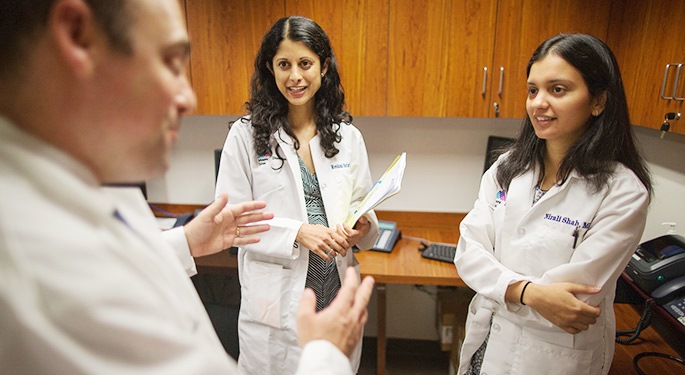Diabetes in the Hospital

At Mount Sinai, we provide comprehensive and seamless care for patients who are admitted to any of our hospitals either for complications related to their diabetes or who have diabetes as an underlying condition.
If you have diabetes and are admitted to the hospital, it can be difficult to maintain glycemic control because of the emotional/physical stress of the illness/procedure and the changes in your diet, physical activity, and medication regimens. We have found that if you can maintain optimal glycemic control, it improves hospital outcomes. We try our best to prevent hyperglycemic and hypoglycemic episodes and to correct any episodes that might occur.
There is controversy surrounding optimal blood glucose levels for non-critically ill hospitalized patients with diabetes. Typically, we recommend maintaining a preprandial blood sugar of less than 140 mg/dL (but no lower than 90 mg/dL) and a random glucose of less than 180 mg/dL. It is important to monitor blood glucose levels and adjust oral meds/insulin as needed. If you are not eating regularly, we will probably stop administering sulfonylureas so that you do not have any difficulties with hypoglycemia.
To avoid any food-drug interactions, please tell your health care team about your past medical history as well as any supplements and/or medications you are taking. It is important to be honest about what you eat so that we can tailor your diet/medication regimen to your individual needs and circumstances.
If your hospital visit is planned in advance, you can talk to your primary physician in advance and discuss possible changes to your medication regimen. You will need to know which doctor will be overseeing your care while you are in the hospital and make sure hospital staff is aware of your diagnosis. When you check into the hospital, bring an updated list of current medications to avoid any food/drug interactions.
At Mount Sinai, we make special considerations for patients with type 1 diabetes. For example, we must continue to give basal insulin even if the you are fasting for a procedure so you do not develop diabetic ketoacidosis. We use your home insulin regiment to help determine the appropriate initial insulin dose, but may use a different dosage in the hospital. We monitor your glucose levels throughout your hospital stay and adjust your insulin doses to keep your blood sugars within normal limits. This will allow for a smooth ransition between home and hospital.
Let us know if you want to continue using your insulin pumps in the hospital. We can help you do so. If you have a good understanding of your blood glucose patterns and are comfortable managing your diabetes, just let us know what type of insulin and pump settings you use, including the insulin to carbohydrate ratio, the correction or sensitivity factor, and target glucose level so that we can make any adjustments that may be necessary. We will assess your ability to manage your pump during your hospital stay, as physical and mental status can deteriorate during admission.